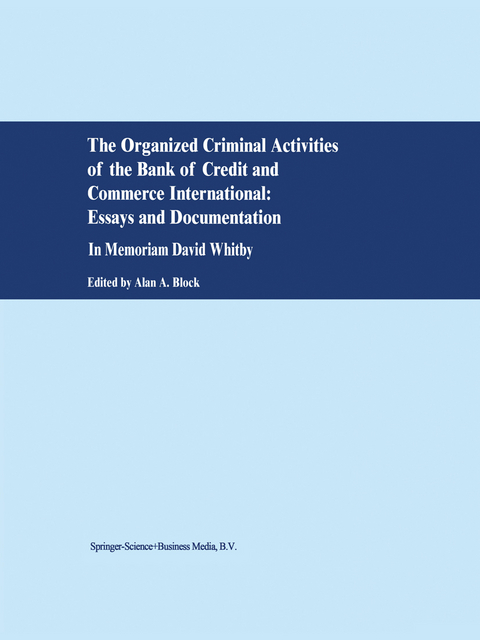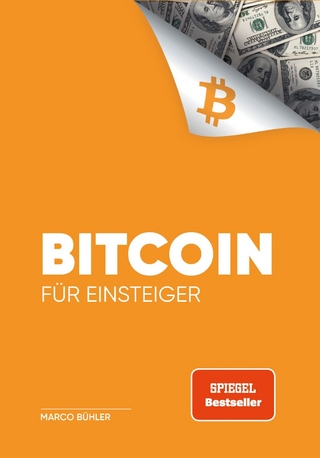
The Organized Criminal Activities of the Bank of Credit and Commerce International: Essays and Documentation
In memoriam David Whitby
Seiten
2001
|
Reprinted from CRIME, LAW AND SOCIAL CHANGE, 35:1-2, 2001
Springer (Verlag)
978-0-7923-7062-8 (ISBN)
Springer (Verlag)
978-0-7923-7062-8 (ISBN)
The Bank of Credit and Commerce International (BCCI), which perpetrated the "biggest bank fraud in history", was founded by Agha Hassan Abedi and initially registered in Luxembourg in 1972. This book includes essays dealing with certain aspects of BCCI's misbehaviour and various odd structures, as well as a document from Luxembourg's Civil Court.
face. As myoid boss when I joined the discout market - who had worked as a "bond-salesman" on Wall Street during the "Great Crash" of 1929, through the Credit Anstalt crash, and served in British military intelligence during the Second World War - always used to say: "Remember! The telephone is not a secure instrument. " During the 1960s, foreign banks had flooded into London in pursuit of Eurodollar deposits. Arabs were spending their new found oil wealth in West End casinos. Ex change Control regulations were tight. In 1971, when our story begins, new "banks" on the fringe took advantage of the property boom, fuelled by Tory Chancellor Barber's first Budget. The discount houses (whose functions and special privileges at the Bank were soon arcane) became active traders in US dollar and foreign currency paper, and took stakes in the new money brokers (or "barrow boys," as the snobs called them, since the sharpest brokers were mainly Cockney Eastenders). While the "gentleman's club" was quickly being replaced by the fast growing "interbank swaps" market (now LIFFE), the discount houses had found a new role to pla- opening representative offices overseas (Gillett Brothers, where I was then chairman, in Southern Africa, UAE, Australia and Singapore, with brokering subsidiaries in Europe, Far East, and North America) - gathering market intelligence around the world, as the invisible "eyes and ears" of the Bank of England.
face. As myoid boss when I joined the discout market - who had worked as a "bond-salesman" on Wall Street during the "Great Crash" of 1929, through the Credit Anstalt crash, and served in British military intelligence during the Second World War - always used to say: "Remember! The telephone is not a secure instrument. " During the 1960s, foreign banks had flooded into London in pursuit of Eurodollar deposits. Arabs were spending their new found oil wealth in West End casinos. Ex change Control regulations were tight. In 1971, when our story begins, new "banks" on the fringe took advantage of the property boom, fuelled by Tory Chancellor Barber's first Budget. The discount houses (whose functions and special privileges at the Bank were soon arcane) became active traders in US dollar and foreign currency paper, and took stakes in the new money brokers (or "barrow boys," as the snobs called them, since the sharpest brokers were mainly Cockney Eastenders). While the "gentleman's club" was quickly being replaced by the fast growing "interbank swaps" market (now LIFFE), the discount houses had found a new role to pla- opening representative offices overseas (Gillett Brothers, where I was then chairman, in Southern Africa, UAE, Australia and Singapore, with brokering subsidiaries in Europe, Far East, and North America) - gathering market intelligence around the world, as the invisible "eyes and ears" of the Bank of England.
— Dedicated to David Whitby.- The Tennessee Bankers.- Conspiracy and cover-up.- Price Waterhouse: Summons before the Civil Court, Luxembourg.- Overseeing and overlooking: The US federal authorities’ response to money laundering and other misconduct at BCCI.
| Erscheint lt. Verlag | 31.10.2001 |
|---|---|
| Zusatzinfo | IV, 176 p. |
| Verlagsort | Dordrecht |
| Sprache | englisch |
| Maße | 155 x 235 mm |
| Themenwelt | Recht / Steuern ► Strafrecht ► Kriminologie |
| Sozialwissenschaften ► Politik / Verwaltung ► Politische Theorie | |
| Wirtschaft ► Betriebswirtschaft / Management ► Finanzierung | |
| Betriebswirtschaft / Management ► Spezielle Betriebswirtschaftslehre ► Bankbetriebslehre | |
| ISBN-10 | 0-7923-7062-7 / 0792370627 |
| ISBN-13 | 978-0-7923-7062-8 / 9780792370628 |
| Zustand | Neuware |
| Haben Sie eine Frage zum Produkt? |
Mehr entdecken
aus dem Bereich
aus dem Bereich
denken und handeln wie ein professioneller Trader
Buch | Softcover (2023)
Vahlen, Franz (Verlag)
CHF 51,65


